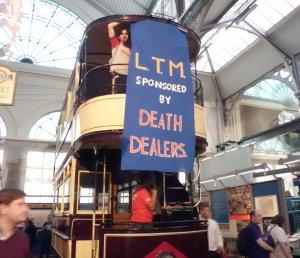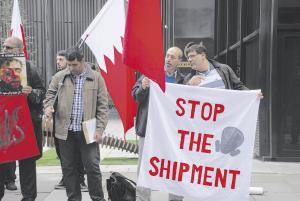What sort of future do we want to invest in? Last month’s NATO summit offered a dystopian vision. Here, ‘building stability’ involved turning Cardiff and Newport into militarised zones, overtaken by security fences and armed police, while warplanes roared overhead. It also involved promoting the commercial interests of the weapons manufacturers that have been the main beneficiaries of NATO’s militarism and force projection.
Defence ministers dined aboard the BAE Systems’ Destroyer…
Arms trade
‘Napalm was born a hero’, argues Columbia University’s Robert Neer about the creation of the sticky, jellied incendiary by US scientists in the Second World War.
Burning at over 800 ° C, napalm played a decisive role in the Pacific War, with perhaps 100,000 Japanese dying in the infamous napalm attack on Tokyo on 9 March 1945. The US ‘scorched and boiled and baked to death’ more people in that one night than died in Hiroshima and Nagasaki combined, according to US air force…
On 16 May, London CAAT carried out a banner drop inside the London Transport Museum to protest at their decision to take sponsorship money from Thales, the 11th-largest arms company in the world. Thales has used the museum’s rooms to meet with the government’s arms export-promoting body (the UK trade & investment defence & security organisation). Follow ‘London Campaign Against Arms Trade’ on Facebook or on Twitter (@londoncaat) to get involved. Next monthly demo at 2pm on 21 June.…
Rolls-Royce directors were confronted with the harrowing testimony of Setsuko Thurlow, a Hiroshima survivor, at their AGM on 1 May. Although the quote was lengthy, the chair was too disorientated to interrupt, and the board responded with nervous laughter.
Rolls-Royce provides power systems for Britain’s Trident nuclear-powered, nuclear-missile-carrying submarine system. In June 2012, Rolls-Royce was awarded a £1bn contract to produce new reactor cores for the Trident replacement…
Rolls-Royce directors were confronted with the harrowing testimony of a Hiroshima survivor, Setsuko Thurlow, at their AGM on 1 May. Although the quote was lengthy, the chair was too disorientated to interrupt, and the board responded with nervous laughter.
Rolls-Royce provides power systems for Britain's Trident nuclear-powered, nuclear-missile-carrying submarine system. In June 2012, Rolls-Royce was awarded a £1bn contract to produce new reactor cores for the submarine that is…
Last September, when the biannual DSEi arms fair came to East London, I took part in a blockade of the ExCeL centre the day before the exhibition opened, hoping to stop the unloading of weaponry for display and sale.
Along with others in the blockade, I was arrested, and charged with obstruction of the highway. When my case came to court, I had to decide whether to plead guilty or not.
It might seem obvious that I would plead guilty. After all, I was lying…
Bahrain Watch and CAAT protest outside the
South Korean embassy, London, on 18 October,
demanding an end to exports of tear gas to Bahrain.
Photo: CAAT
The government of Bahrain has been using tear gas to repress pro-democracy demonstrations since the Arab Spring spread to the Gulf state in February 2011.
A Physicians for Human Rights (PHR) report in 2012 found that ‘Bahraini law enforcement officials routinely violate every UN principle’ in their ‘unusually…
Activists celebrate their success outside the Savile Club. PHOTO: Stop the Arms Fair
When Stop the Arms Fair activists showed up at the Savile Club in central London at 8am on 8 October, they discovered that a ‘security breakfast briefing’ they were going to protest outside had been moved to a secret location.
The breakfast (cost £72 per attendee) was part of a series organised by the London chamber of commerce with military industry leaders as keynote speakers and arms dealers and…
‘We respect the protesters... [but] they may not understand the benefits of defence exports... If you said to CAAT how would you feel if 400,000 people lost their jobs, they may have a different answer’. So said one of the government’s chief arms sellers in response to the campaign against the Defence Security and Equipment International (DSEi) arms fair in September. (Telegraph, 8 September)
With one inaccurate and misleading statistic, concerns over the indiscriminate…







